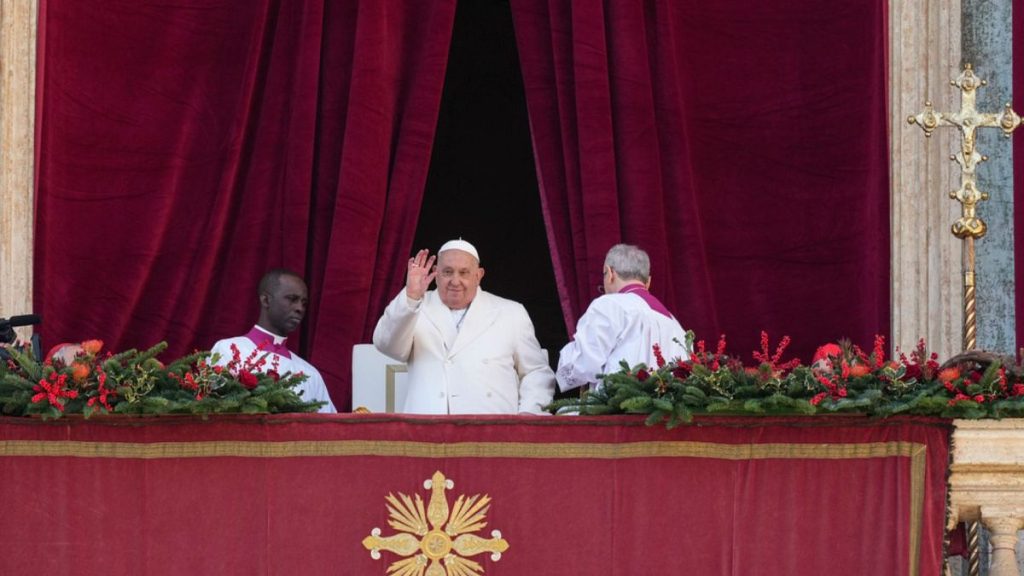The Catholic Church’s Jubilee year, a significant event occurring every quarter-century, commenced with a poignant ceremony orchestrated by Pope Francis. Deviating from tradition, the Pope chose to inaugurate the second Holy Door of the Jubilee year not at a prominent religious edifice, but at the Rebibbia prison in Rome, underscoring his enduring commitment to prison ministry and his message of hope for the incarcerated. This act, following the traditional opening of the Holy Door at St. Peter’s Basilica on Christmas Eve, symbolized the extension of the Jubilee’s redemptive spirit to all, particularly those often marginalized by society. The Pope’s gesture emphasized the universality of the Jubilee’s message, extending its embrace beyond the grandeur of the Vatican to the confined spaces of a prison, echoing the theme of inclusion that has characterized his papacy.
The Pope’s decision to prioritize the prison visit resonated deeply with his long-standing dedication to pastoral care for inmates. Throughout his tenure, he has consistently visited prisons both within Rome and during his international travels, reaffirming his belief in the inherent dignity of every individual, regardless of their past transgressions. His presence at Rebibbia, a place often associated with despair and isolation, served as a powerful reminder of the Church’s commitment to those on the margins, offering a beacon of hope amidst challenging circumstances. This act of solidarity conveyed the Pope’s conviction that even within the confines of prison walls, the potential for redemption and spiritual renewal remains ever-present.
The Jubilee year, a tradition dating back to 1300, holds profound significance for the Catholic Church, representing a period of spiritual reflection, forgiveness, and renewal. The opening of the Holy Door symbolizes the opening of a pathway to God’s grace and mercy, inviting believers to embark on a journey of spiritual introspection and reconciliation. The Pope’s choice to open the second Holy Door at Rebibbia imbued the Jubilee year with a particular focus on the plight of the incarcerated, emphasizing the importance of extending compassion and understanding to those who have stumbled in life. This gesture highlighted the Jubilee’s potential to foster social justice and promote restorative practices within the criminal justice system.
The Pope’s message of hope resonated particularly powerfully within the context of Rebibbia prison, where the stark realities of incarceration often weigh heavily upon the spirits of inmates. The high rate of suicides within Italian prisons, as documented by the Antigone report, underscores the profound despair that can pervade these institutions. The Pope’s presence and his words of encouragement offered a lifeline to those struggling with hopelessness, reminding them of their inherent worth and the possibility of a brighter future. He encouraged them to cling to hope, comparing it to an anchor that provides stability and prevents one from being adrift in the sea of despair.
The Pope’s visit to Rebibbia culminated a demanding week of Christmas celebrations, including the Christmas Eve Mass at St. Peter’s Basilica and the traditional Christmas Day blessing. Despite the physical demands of these events, especially considering the Pope’s age and occasional respiratory issues, he prioritized the prison visit, demonstrating his unwavering commitment to the marginalized and his belief in the transformative power of hope. His actions served as a powerful example of servant leadership, prioritizing the needs of the vulnerable and demonstrating the true spirit of Christmas.
The Pope’s inauguration of the Jubilee year at Rebibbia prison stands as a significant departure from tradition, imbuing the celebration with a profound message of hope and inclusion. His unwavering dedication to prison ministry, his emphasis on the inherent dignity of every individual, and his call to cling to hope resonated deeply within the confines of the prison walls, offering a ray of light to those often overlooked by society. This act served as a powerful reminder of the transformative potential of the Jubilee year, extending its reach beyond the traditional confines of the Church to encompass those most in need of its redemptive message. The Pope’s gesture emphasized the importance of compassion, forgiveness, and restorative justice, challenging society to re-evaluate its approach to incarceration and to embrace the possibility of rehabilitation and reintegration for all individuals, regardless of their past mistakes.










